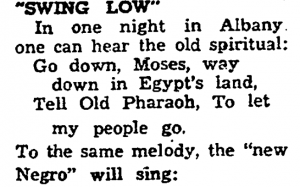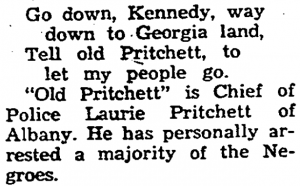Folk music is one that draws many questions from American music historians. Questions like, “who owns folk music?”, “where did these tunes originate?”, and “what is a folk song?”. One perspective that is particularly interesting and comes to a strong conclusion is that the origin of American folk music is based upon African Tradition. An article in The Chicago Defender claims that from African Americans and slave music, the genre of folk emerged. The argument is that the melodies of African American music prior to the Civil war were considered true American folk songs. Some original, but also based on African traditional music. The English, French, and Spanish all brought their own style of song to the United States, so their music isn’t naturally American. Oscar Saffold wrote in his article, “There is, however, a real indisputable folk song in America, an American production, born in the hearts of slaves — expressing a part of the life of our country.” This can be argued against, saying that the music of the slaves is originally from Africa, but Saffold’s argument is moreover strong, in that the African American traditional music had a large influence on proceeding music styles such as the blues and then jazz.
During the time of the Civil Rights’ Movement, there were many protests in southern United States, to express the desires and rights of equality among people; To blur the racial lines. These protests were filled with demonstrations that used art to promote equality, and the folk song emerged as an effective protest song. This incorporated the melodies of the old slave songs, but with new words. For example:
This type of folk song is called a freedom song. It was used as a way to unite a community of people during the Civil Rights’ Movement, and was thought to communicate and express sentiments when words weren’t enough. This is tied into the work songs of slaves during the Antebellum South.
A poignant quote from the article says, “while there is no American folk song in the sense of expressing American life as a whole, still there is a folk song in America, and that is the music of the Negro” (Saffold). The roots of American folk music go deep into the history of the African American slaves of Southern American, and since, folk music has taken on many other attributes with the Folk Revival of the late 20th Century.
Bibliography
Saffold, Oscar E. “How american folk songs started.” The Chicago Defender (National edition) (1921-1967), 25 Feb. 1933. http://search.proquest.com/docview/492356076?accountid=351
“Songs seen Vital in Albany Demonstrations.” Chicago Daily Defender (Daily Edition) (1960-1973), 22 Aug. 1962. http://search.proquest.com/docview/493909703?accountid=351.



I think it is interesting to think about the origins of different country’s folk songs. When you compare America to those other countries mentioned, America is huge in terms of population and land area. So naturally, we will have a larger variety of folk song coming from different parts of our country. America is more like a Wal-Mart than a specialty store. Often, even today, I think Americans forget just how big our country is and how much diversity we have. There is no one “American way.” It would be very difficult to sum up our country and its different aspects of history in a single sentence.
Great finding, Alex. I was not surprised that American folk music was based upon musics in other culture, but still great to find out the fact that it was mainly based on African traditions and slave music. Your post make me more curious about how folk music gradually “took charge” by white people, especially during the “folk revival” time. How people filled new words to old songs in order to promote equality was really interesting, and I guess these freedom songs popularized and “protected” certain folk songs from fading away.
Hello E! I think you have such a great source with your two newspaper clippings. To be able to visualize and in a sense hear how these classic freedom songs were taken and adapted to fit the events of the time period is exciting and i think it sheds light on the history of the march. I’m also quite intrigued by the quotation that is in your final paragraph. I believe I am in agreement with Saffold in the sense that there is no one style of folk that is all-encompasing, but I’m curious about the source as it does come from a primarily black newspaper and how much that plays a role into stating that African american music is the main root to folk. Exploring biases could be interesting in the future!